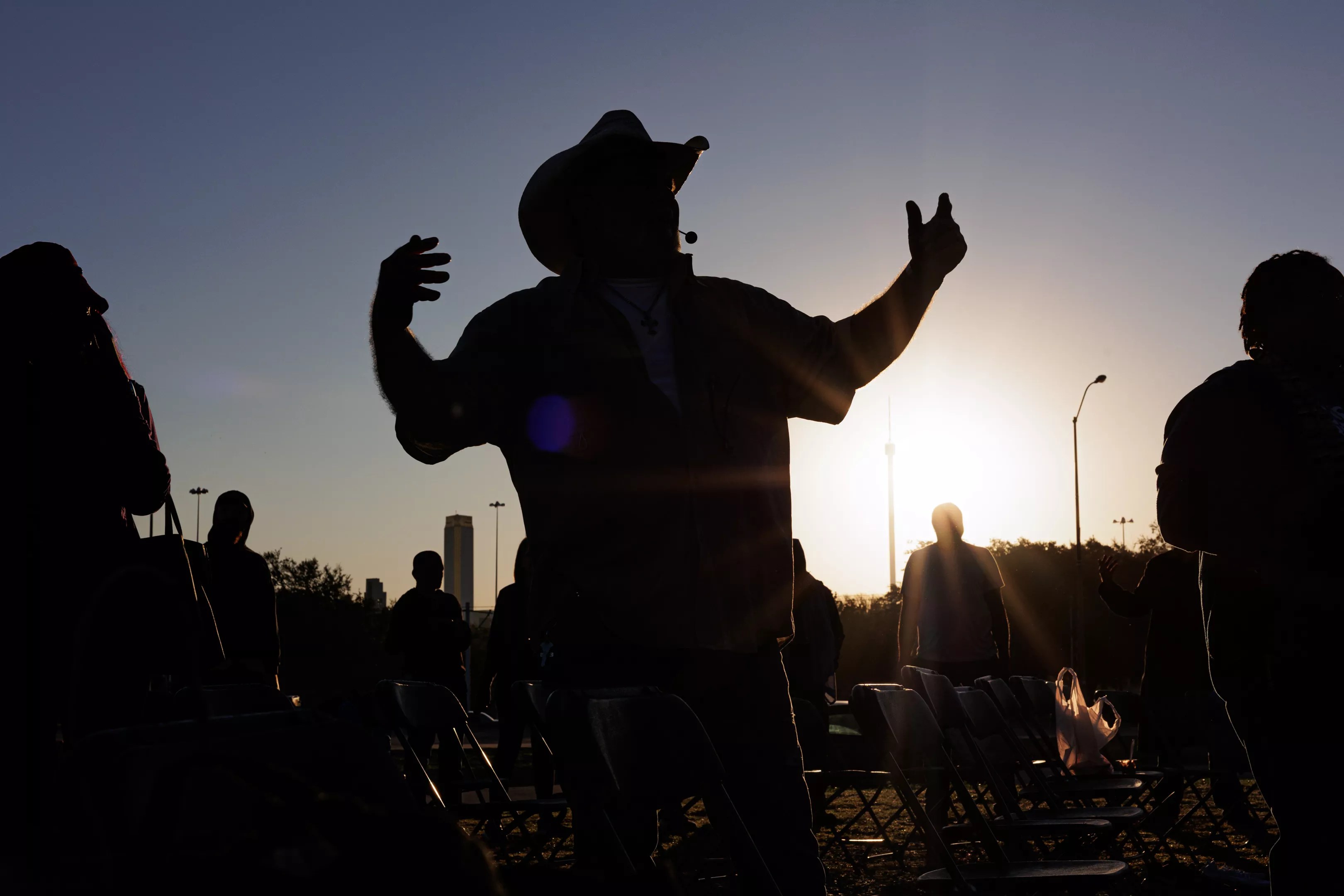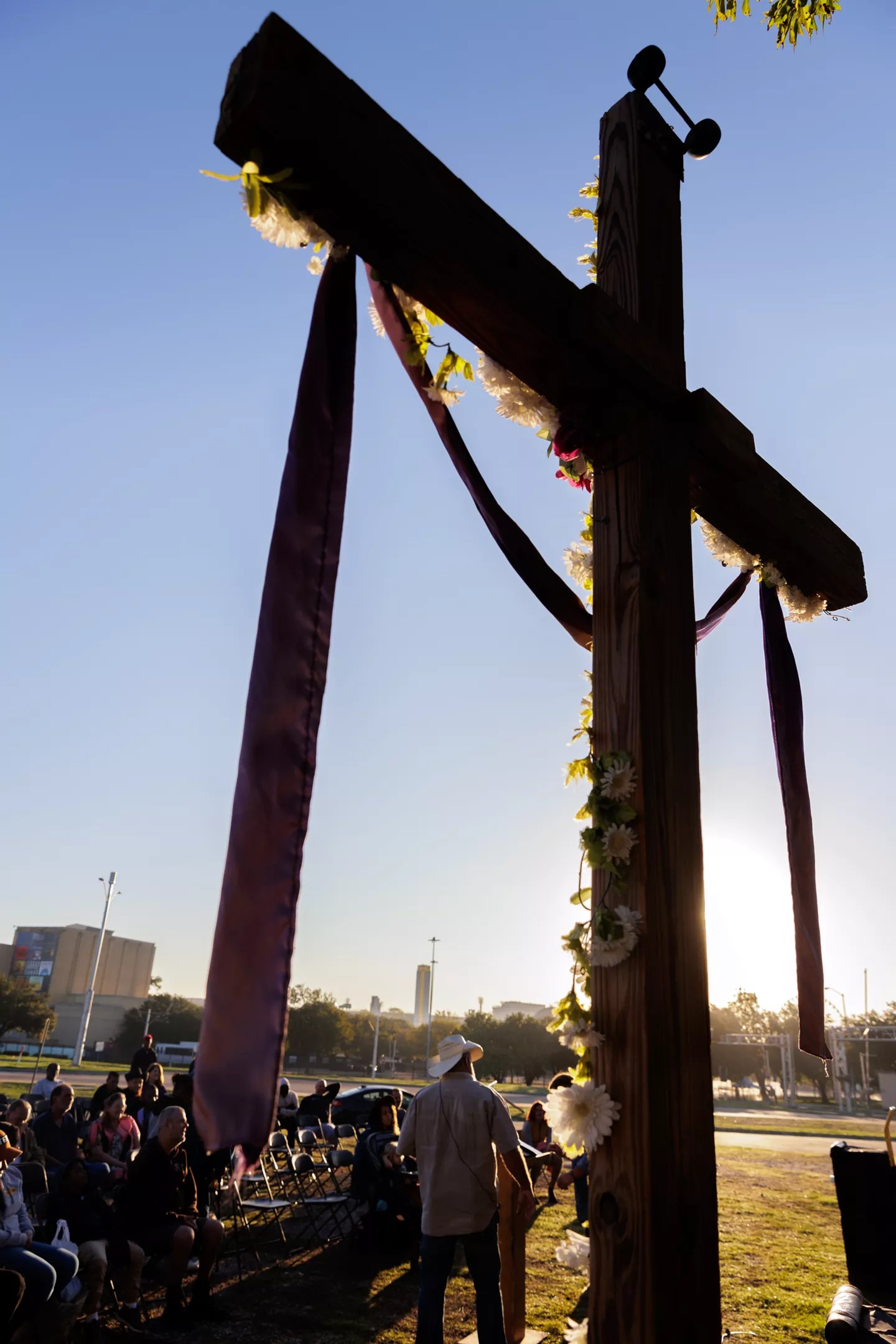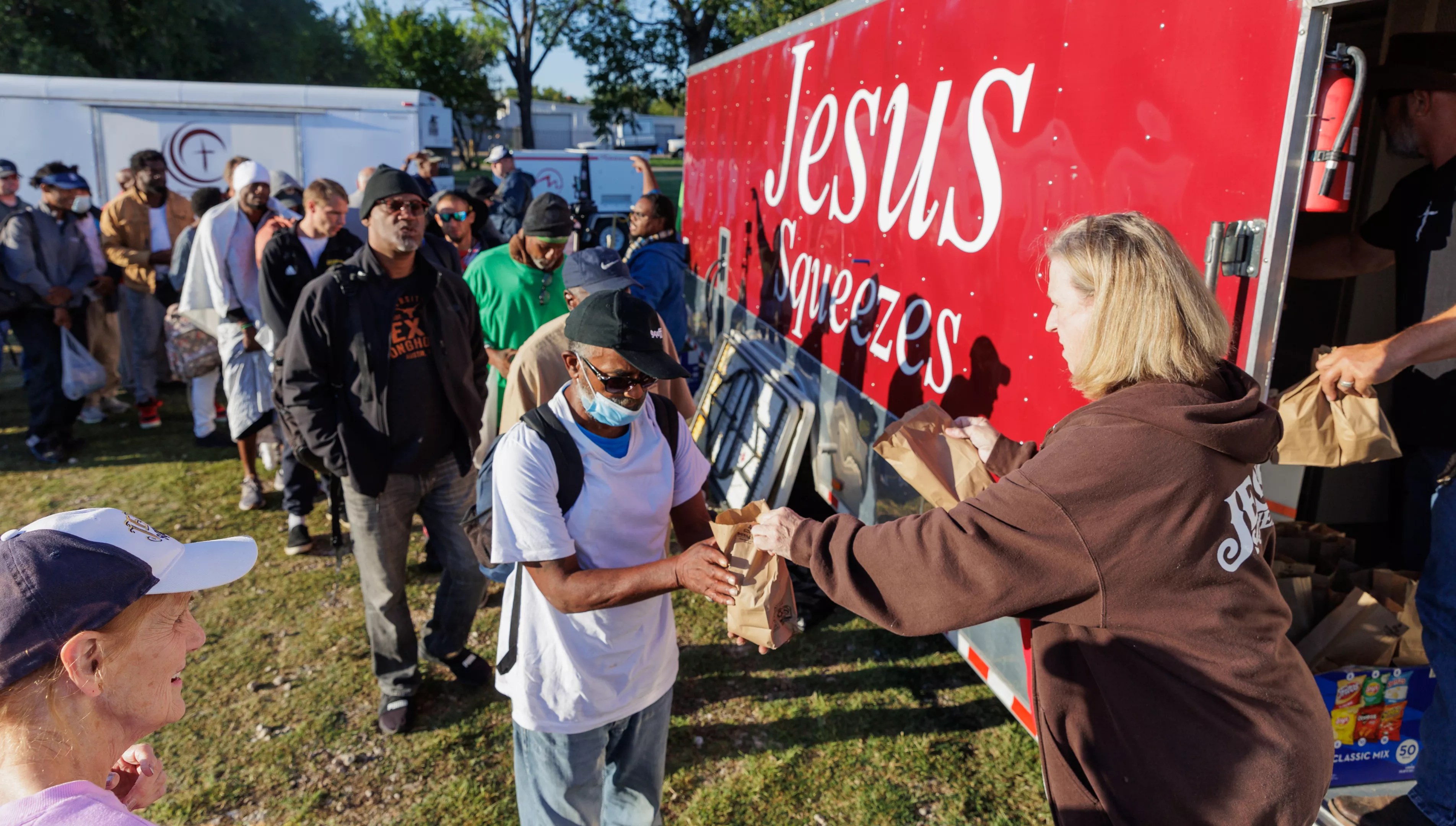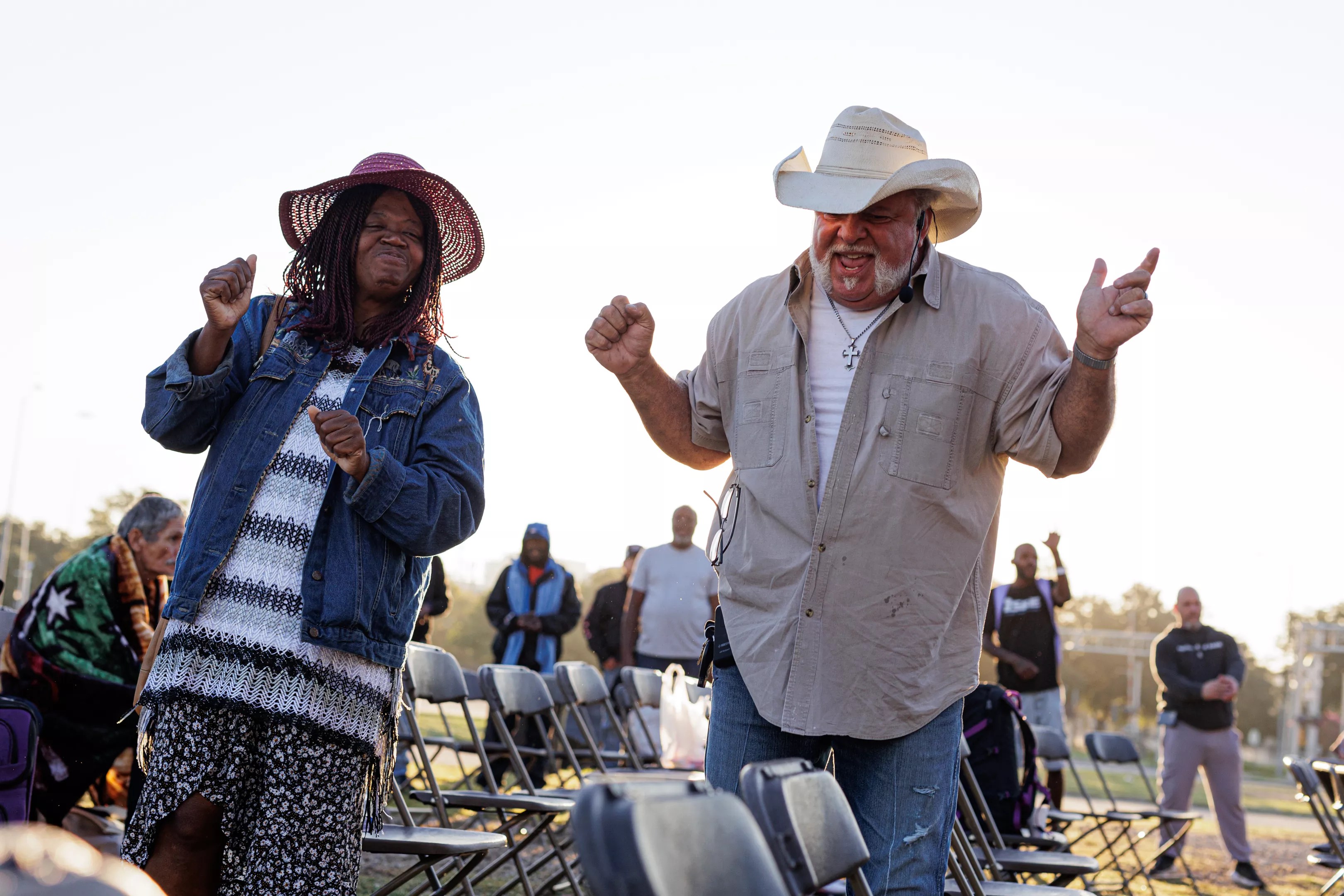
Nathan Hunsinger

Audio By Carbonatix
One hot, sunny Sunday in fall, as he has done so many times, Pastor Leon Birdd stood outdoors, wearing a microphone in the center of a circle of people. Many of the people around him were homeless. Birdd has a husky build and a short, white beard that wraps around his face. Surrounding him on that day were members of S.O.U.L. Church, a ministry and nonprofit based in Dallas. Some of them had simply lost their way in life. Birdd, wearing a shirt that says “Jesus Squeezes” (that’s what he calls hugs), told the group that he, too, had once been lost.
Birdd is one of the main faces behind S.O.U.L. Church, alongside his wife, Jennifer. S.O.U.L stands for Servants Of oUr Lord. The church has no roof or walls. Every Sunday morning, S.O.U.L. Church meets outdoors on a lot near Fair Park to feed the homeless. The church has from 30 to 40 volunteers who help feed some 250 people every Sunday. Many of those in attendance are wearing T-shirts and jeans or shorts. Some of them can be seen sleeping through the Sunday service, but plenty of others are willing, active participants.
Birdd wasn’t raised in the church. He grew up poor, so naturally, he thought whatever God presided over this world was a cruel one. As he got older, he didn’t think all that much about God. Instead, he developed an affinity for partying and drugs. So, that’s what he was doing with a colleague before a day of construction work years ago, he told the crowd standing around him. He was freebasing cocaine with someone he called Skid, as in Skid Row.
“That day while I was getting stoned, he [Skid] said ‘Hey, think of your worst sin,'” Birdd recalled. “I said, ‘Skid, what’s up with that? Man, you’re gonna bring me down.'”
Skid said he didn’t have to tell him what his worst sin was but that Jesus would forgive him for it. “Well, good for Jesus. I can’t forgive myself,” Birdd replied.
“Oh, so you’re saying you’re more powerful than Jesus,” Skid said.
“I ain’t saying that,” Birdd replied. Skid insisted that’s exactly what he was saying.
“Right there and then, I felt a sense of all my guilt and all my shame just lifted from me. It was absolutely wonderful,” Birdd said. “From that day, I never partied again.” Today, he says it was Jesus who came down and pulled all the guilt and shame from his body.

Pastor Birdd recently created a board to keep S.O.U.L. running when he retires.
Nathan Hunsinger
The church is more than just a place for the homeless to get a bite to eat. It’s also where they can find a sense of belonging and community. They don’t have to be all about God to reap the benefits of the church – they need only show up. It can become a constant in their lives that they might otherwise not have.
The church sets up around 6 or 7 a.m. every Sunday. Volunteers bring food along with a stage and speakers for music. Sometimes they bring clothes and other items homeless attendees may need.
Many people said they first found out about the church by following the sound of music that blares through those speakers every Sunday morning.
As the sun beat down on everyone that hot fall Sunday, the circle of people began to disperse. Some went to the food line to fill their stomachs with BBQ chicken sandwiches and macaroni and cheese, while others hung back to pray.
One longtime member of the church named Debra McKernan was helping prep the food for the day.
McKernan, 66, said she was living at The Bridge the first time she heard the music at S.O.U.L. Church. She wasn’t very happy about it. “I was furious,” she said.
It was early one Sunday morning around 5 a.m., and the church was meeting across the street from her. McKernan had just gotten out of jail on drug charges. She packed up all her belongings and went to where the music was coming from. She found the church. “I said, ‘You need to turn your stupid music down,'” she recalled. They didn’t.
“But there was something that kept drawing me back, which was really odd,” she said.
It was odd because she didn’t like God at the time. She was angry at him for all the things that had happened in her life. She had gotten divorced after learning that her husband had molested their daughter, she said. Then, her nine-year-old daughter was killed in a car accident. Seven years later, her son died of a heroin overdose. “So, I ran for 30 years from God,” she said. In her anger, she turned to drugs.
She became a drug dealer and a pimp, but she was miserable, and she eventually hatched a plan to kill herself. She was done, not with drugs necessarily, but with life. “I was void of feelings,” she said.
She packed up everything to put in storage, wrote letters to her two living daughters and went to a motel to kill herself. Her mother had committed suicide and McKernan hated her for it, but she was ready to do the same thing. Instead of a motel room, she found herself in a jail cell that night after being arrested for possession of a lot of drugs. She went down for seven felonies and three misdemeanors the night she had planned to end her life.
Today, she feels like the whole situation was supernatural in a way. She had a hiding spot built in her car where she would usually keep her drugs. “Every time I got in, I put my drugs there and locked it up,” she said. That night though, she had drugs in her purse and in the passenger seat of her car, which was highly unusual for her.

The congregation meets outside near Fair Park.
Nathan Hunsinger
Ready to die, she had crack, heroin and meth in her car, but she was stopped by police because of a broken headlight. McKernan was arrested for possession and manufacturing and delivering controlled substances. “God really wanted me in jail. He did not want me behind that [motel] door because I was taking things into my own hands and that wasn’t what he wanted,” she said.
She got clean in jail and while there, she was warned not to go to The Bridge upon her release. McKernan was told that because she was white, she would get picked on at the shelter, she explained. She went to The Bridge anyway and said she was treated fine. She now calls the place the “Cadillac of shelters.” It was there that she eventually heard the music.
She doesn’t know why, but she kept going back to the church and eventually Jennifer Birdd came to talk to her. “You need to hang out with us,” Jennifer told her. “I just remember thinking ‘Why would I want to hang out with you?'”
But she obliged. She needed to complete 800 hours of community service as part of her sentencing. She ended up doing all 800 hours with the church. Through that time, she had an epiphany.
“I’m looking at him like he’s a God of anger and is just mean. I believed he’d put a target on my kids’ back and that he was picking off my kids because of my lifestyle,” she said. “But that’s not what it is. I know that now. I didn’t then.”
One day, just a couple of months after she had found the church, she was looking around at all the people who had gathered that Sunday and she started to cry. After leaving her husband, she swore she would never go to church again, but she looked around and realized that’s exactly where she was. It didn’t look the same, but she was certainly in church. “All of a sudden I realized that God knew my situation,” she said. “He knew what I was capable of listening to and what I was capable of not listening to.” She said she probably wouldn’t have listened if she had been in a traditional church. And she would have never heard the music had she listened to those who urged her to stay away from The Bridge.
“Out here, I turned around and I looked and all of these people were just like me, just as broken as me or more,” she said. It was at that moment that she realized S.O.U.L. Church was exactly what she needed in her life. After completing her community service hours with the church, she was offered a job with S.O.U.L. “The last thing I thought was that I would be the church lady,” she said. “That was 10 years ago and I’m still here.”
She’s now out at the church every Sunday. She does the cooking and keeps the books for S.O.U.L.
It’s not the same food every Sunday. She has cooked prime rib and salmon for church attendees. Another time, she cooked a seafood boil with lobster. “I love that. I love being able to give them flavors and stuff that they’re not able to get anywhere else,” she said. “I find that exciting.”
As it did for McKernan, the church has touched many people over the years since it started in the ’90s.
But the vision for S.O.U.L. Church didn’t come together overnight.

S.O.U.L. feeds visitors free meals on Sundays.
Nathan Hunsinger
It started one day in 1994 when Birdd noticed a man walking along the side of the road. The man walked oddly, appearing to take two steps forward and one step back with every stride, Birdd said. Something spoke to him that day. He didn’t know it at the time, but these days he says that something was God. It came in a voice that told him to pick the man up. Birdd didn’t really want to, but he listened to the voice.
When Birdd first approached him, the man said, “Leave me alone, I’m not drunk,” Birdd recalled. He said the man talked kind of funny and he almost couldn’t understand what he was saying. “I don’t care if you’re drunk,” Birdd replied. “Do you want a ride?”
The man, Robert Shuemake, said he did want a ride and got into Birdd’s truck. He said he was walking to a Walmart, a long way from his home. Shuemake told Birdd he had been an electrician and that he fed the homeless. Birdd responded, “You’re going to have to forgive me. Look, it’s obvious you have something wrong with you. You don’t walk right. You don’t talk right. How do you feed the homeless?”
Shuemake said he did so with the help of others. “Who?” Birdd asked. “God brings people,” Shuemake replied. Shuemake then told Birdd to pick him up early one morning to help feed the homeless.
Shuemake took his hat off and showed Birdd the scars on his head left by five brain surgeries. The ordeal had taken away some of Shuemake’s mobility and affected his speech, Birdd said.
Shuemake insisted that Birdd come and pick him up that Saturday at 5 a.m. to feed the homeless. “I ain’t gonna do that,” Birdd thought. “I dropped him off and that was it.”
Later that week, the same voice that told Birdd to pick the man up returned. “That guy is out there waiting for you,” it said. So, he drove to Shuemake’s house. “Please don’t be there, please don’t be there, please don’t be there,” Birdd thought to himself. Sure enough, the man was there, with two five-gallon containers of coffee. They drove to a Dunkin’ Donuts and the shop gave them a little basket of day-old donuts. They headed to downtown Dallas, and before too long, homeless people started showing up one by one to get a free breakfast.
“But there was something that kept drawing me back, which was really odd.” – Debra McKernan, S.O.U.L. Church volunteer
This went on for a while, Birdd said. It started as a small operation in 1994, but it eventually grew and evolved into what it is today. The church now has several vehicles, meets every Sunday and distributes food to some 13 counties through something it calls the S.O.U.L. Shared Food Ministry.
These days, the church has its regulars, like Daniel Getz, 54. He’s been showing up for years. Now in housing, Getz was homeless for five years. “What happened to me was I had a divorce and my whole world just basically fell apart,” Getz said. He was also diagnosed with bipolar depression. When he was homeless, he would turn out to The Bridge for meals. That’s around the time he heard the music at S.O.U.L. Church. “I heard this music and I was like ‘What is that?'” he said. “It was something different. There was something different to it and it drew me.” He’s been turning out to the church ever since.
Then, there’s James Sheufelt, 70, who claims he performs miracles at the church, such as curing people’s medical ailments. “We have people who had cancer of the chest and it just disappeared instantly with Christ Jesus,” he said. “He is the healer, the only healer. It’s his spirit that gets into people and heals. Sometimes I feel like if I don’t get up and I don’t come down here, somebody may die because I didn’t show up.” We’re not so sure about that, but he and some others at the church believe it.
Another man, Matt Sloan, was also staying at The Bridge when he first heard the music. He was using meth at the time. “I heard the music, went across the street, saw the church and prayed out loud to myself and said ‘Jesus, if I ever get out of this jam I’m in, I will come to this church,'” he recalled. “That’s what I’ve done and I’m four and a half years sober.” Now, he has a bus that he uses to pick people up and take them to S.O.U.L. He also feeds the homeless during the week. “This church has value because it’s down in the trenches,” he said.
Birdd said he used to serve people in various parking lots downtown. He guesses he and his flock had gotten kicked out of about 15 over the years. Eventually, the traveling church found a home across the street from The Bridge. The spot essentially fell into their laps at the perfect time.
Birdd said under Mayor Laura Miller the police started citing people for feeding the homeless. “I thought ‘Man, I guess I’m just going to go to jail because I’m not feeling led to stop. Inside, I know this is what I was created for,'” Birdd said.
Around the same time police were getting ready to start citing people for feeding the homeless, the owner of a nearby business called Millet the Printer came to Birdd. He said he had cameras in the area and that he had been watching them. He told Birdd that he noticed the group would clean up the area whenever they were done. So, he offered the keys to his parking lot to Birdd. It was right across the street from The Bridge. The business owner said “You can use it as long as I like you,” Birdd recalled. This gave the group a private property from which to serve the homeless so they wouldn’t be cited. They gathered on the property every Sunday for about 12 years.
Along the way, Birdd met his wife Jennifer.
When Leon met Jennifer, the two were working at Home Depot. Leon, who was married, was also attending a Bible college at night then and was later ordained. Eventually, Jennifer left Home Depot to work for herself in landscaping. But one day she returned to that Home Depot and Leon gave her a quote on a fence. The two got to talking and Jennifer noticed Leon wasn’t wearing a wedding ring any more. The two started dating after that and later got married on the streets of downtown, surrounded by people the church serves. They’ve been together for 17 years.
“We’re touched by so many people. I’m talking thousands a month that we come in contact with, and then there’s not a clock-out button at the end of the day.” – Jennifer Birdd, S.O.U.L Church
Jennifer jokes that she married into S.O.U.L. Church. “I’ve always loved people,” she said. “I’m a troubleshooter. I’m a nurturer, too, so when I see there’s a situation, I’m always trying to come up with answers.”
Jennifer said she wears a lot of hats within the church and it can be hard to be faced with all the struggles of the people they serve. “I’ve found that there are a lot of hardships,” she said. “Then, you have people who, it hasn’t been a lifelong struggle – it’s something that just happened.”
And free food and faith can only do so much.
“The struggle for me is that there’s a lot of things I can’t do anything about. The struggle with the people we love on is that there’s a lot of things they can’t do anything about, and they get to a place where they give up and they stop trying to do anything about anything. So, their situation stays the same.”
She said on the flip side, there are things they can do to help people find their way.
“We just have to reopen the eyes of the people who forgot that they could and hopefully cause an awakening and put some fire under their feet,” she said. “That’s the challenge.” She said sometimes the work can feel like trying to put out a wildfire.
The church often faces people dealing with homelessness, poverty, abuse and mental illness. “There is beauty to it because we love them,” she said.
She recalled one Sunday morning when she was feeling down, but seeing everyone else so happy to be at the service uplifted her. “The challenge is not to see only the challenges, but to see the beauty. That’s the biggest challenge,” she said.
It hasn’t been smooth sailing getting to where S.O.U.L. Church is today. Most of the church’s money comes from personal donations. Leon said sometimes funding gets a little low and it worries everybody. But he, Jennifer, the church volunteers and attendees just try their best to roll with the punches.
Jennifer said her husband seems to see everything through rose-colored glasses, while she calls herself a realist. If he weren’t that way, she believes, he’d likely quit what he’s doing. She sometimes prays to be able to see things the way he does. It can be easy to start feeling like there’s no light at the end of the tunnel, but she said there always is one. “I just deal with one situation at a time,” she said.

Pastor Birdd and a S.O.U.L. church congregant are moved by the music.
Nathan Hunsinger
“We’re touched by so many people. I’m talking thousands a month that we come in contact with, and then there’s not a clock-out button at the end of the day,” she said.
It can also feel like a war zone sometimes. “We go out there, we have no idea what we’re fighting against today,” she said. “We don’t know if somebody’s going to have a meltdown. We don’t know if someone’s going to overdose. We don’t know if someone’s going to miscarry or if they’re thinking of murdering somebody. Those are things we really do face.”
But with all the struggle, there are also many good times and happy stories of people who come through the church and manage to turn their lives around. These are the stories that encourage Jennifer and often make her cry tears of joy. She said they won’t know how many people the church has touched until they get to heaven.
When she considers quitting, she just thinks about all the people who would end up hurting. She said what keeps her going is that she knows this is what she was meant to do. “I’m called to love the broken, to love humanity, to help in crisis” she said. “I’m wired this way.
Leon said he’s getting older and he often thinks about the future and how S.O.U.L. Church will continue beyond him. He guesses he’ll be doing this for another ten years before he’ll need to pass the torch. The church recently created a board to help carry on the work.
“So many ministries come and when the leader passes, it’s done,” he said. “It shouldn’t be like that. It should be a work that keeps going. Someone laid the groundwork. Someone needs to come along and take it up farther than that. But they have to have the right heart.”